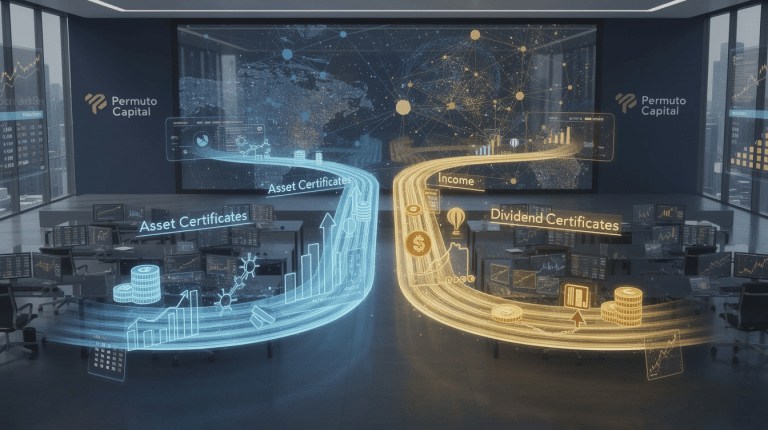The information provided in this article is for informational purposes only and should not be considered as investment or financial advice.
In the recent weeks, there have been a number of announcements about new platforms offering some form of tokenized stocks (or other securities) with notable recent ones from well-known centralized exchanges:
These tokenized products all promise similar advantages to one another but also differ in important ways compared to what Permuto Capital’s trusts and asset/dividend certificates intends to offer once available for trading. Besides the obvious fact that they don’t split the dividend component from the underlying, these tokenized stock offerings also differ in that they:
- Cover a different set of equities
- Are not native tokenization of securities
- Are not all available for 24/7 trading
- Are hosted on EVM (and EVM-like) chains
- Are not available to US investors
- Have different investor requirements (e.g. KYC/AML)
- Have different handling of dividends and tax considerations
- Do not all offer share redemption and hence don’t convey full ownership rights
- Do not all passthrough voting rights
- Are most likely security-based swaps which have regulatory implications
Side-by-Side Comparison
| Feature | Robinhood | Kraken (xStocks) | Gemini (Dinari) | Permuto Capital |
|---|---|---|---|---|
| Number of Stocks | 200+ stocks & ETFs | 60 stocks | 20+ stocks | 3 announced (MSFT, AAPL, AVGO), targeting 80+ dividend paying equities |
| Trading Hours | 24/5 in-app | 24/5 on Kraken, 24/7 on-chain | 24/7 | NYSE American hours, 24/7 on Chia |
| Blockchain | Arbitrum | Solana | Arbitrum | Chia |
| Geographic Availability | EU only | Not accessible in the US, Canada, UK, EU, or Australia. | EU only | Worldwide |
| Dividend Handling | Paid in-app | Reinvested into tokens | Paid on-chain to KYC verified entities | Paid to all DC holders |
| Voting Rights | No | No | No | Yes |
Why these differences matter
Some of the differences such as true 24/7 availability, access to the largest investor base in the world (the United States), and permissionless trading have obvious benefits. Others require a bit more explanation.
Native on-chain issuance
Earlier this week, SEC Commissioner Hester Peirce published a statement on tokenization, highlighting the fact that tokenization itself isn’t a magical process that relieves market participants of regulatory obligations.
Mike Cagney, CEO of Figure Markets, wrote a good breakdown of Peirce’s statement and how tokenized stock offerings are impacted. Specifically, wrapped products (tokenized representation of an off-chain asset) is subject to the same regulations as the underlying itself and it seems none of the centralized exchanges are currently able to meet those.
Cagney’s thought is that the “only way equities work on blockchain is if they are issued natively on chain” which is exactly the approach Permuto Capital is taking. Their AC/DC securities are issued *either* natively on-chain or on DTC — one is not a wrapper or representation of the other.
Trading securities on EVM-like chains
Gene Hoffman wrote a blog post on “The Challenges of Trading Securities on Most Blockchains” that discusses how MEV (Maximal Extractable Value) that exists on EVM (Arbitrum, Etheruem) and EVM-like chains (Solana) opens the door for market manipulation.
“Much to the chagrin of many industry participants, and despite the myriad claims of MEV “enabling liquidity,” we believe doing this to a known securities transaction is clearly market manipulation under Section 9(a)(2) of the 1934 Act.”
Another aspect is the Offer Files functionality available in Chia that other chains don’t have as a cornerstone of their ecosystem. Offers allow for a marketplace composed from P2P offers akin to bulletin board trading.
Security-based Swaps vs Securities
Why is this classification important? Stay tuned for a future post on the topic and examples of enforcement actions the SEC has brought to products classified as security-based swaps.
Conclusion
This post isn’t meant to suggest that Permuto Capital’s AC/DC certificates are a strictly better product compared to other tokenized stock offerings as they have a different purpose and don’t even cover the same set of equities. For example, you won’t be able to buy an AMZN (Amazon) AC anytime soon since the stock doesn’t currently pay dividends.
The takeaway is to understand the intentional choices in technology and regulatory path Permuto Capital is following and how it manifests in fundamental differences to other related products on the market.









